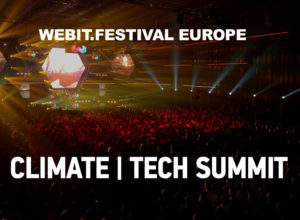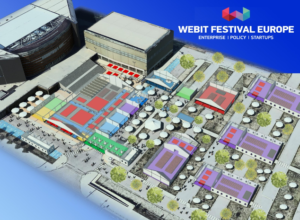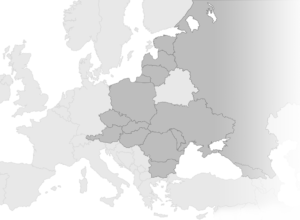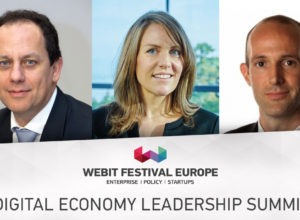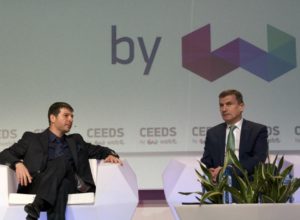Tag: Europe
What steps we need to take to secure the future of...
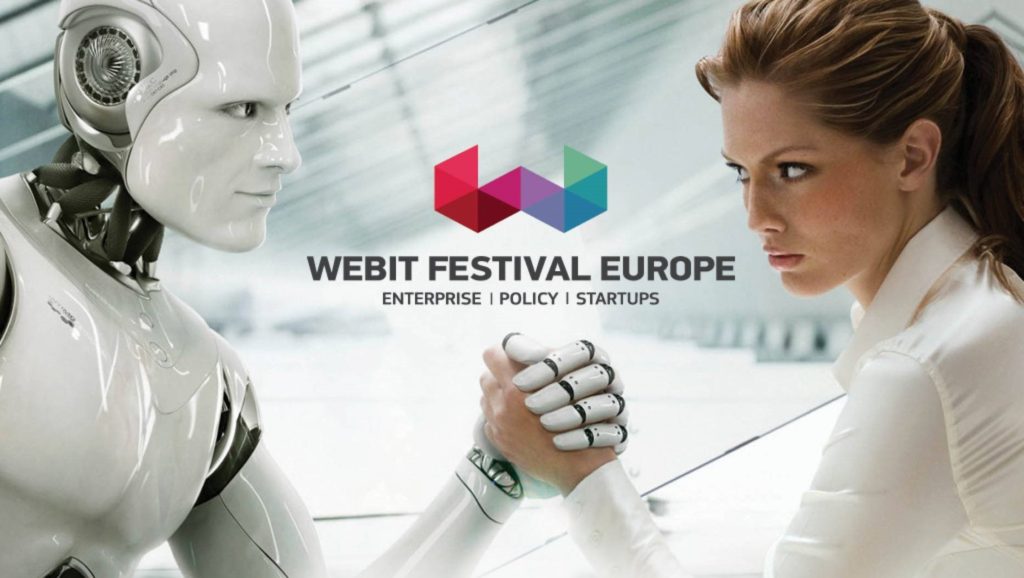 We are all living in a time of exponential change both in our societies and economics. The new industrial revolution and the rise of robots and automation will change dramatically the way we live, communicate and entertain ourselves. But probably the most crucial change will come in our workplace, where we will need a completely new set of skills to stay competitive.
According to the annual Future of Jobs Report, issued by the WEF, by 2020, more than a third of the desired core skill sets of most occupations will be consist of skills that are not yet considered crucial to the job today.
Soon we will all need to make a serious effort to develop our soft skills, such as persuasion, emotional intelligence and the ability to teach others. Experts think that there will be a higher demand for such abilities, than the narrow technical skills.
This, among many other topics, will be discussed during the Innovate! & Plenary Session of this year’s Webit.Festival Europe - the largest event for innovations and entrepreneurship in this part of the world.
Students today think that getting a four-year university degree is the only way to become part of a global company such as Google, Apple or Amazon. But business leaders like the CEO of Siemens USA Barbara Humpton and her colleague in Apple Tim Cook are already questioning this old-fashioned career path.
Recently Cook pointed out that the US employment at Apple includes a lot of people who did not have degrees. And the main reason for that is the fact that most of the colleges do not teach the skills business leaders need, such as coding for example.
According to a LinkedIn report, prominent companies do not require that employees have college degrees. The data analysis of the social network identified, tha positions like electronic technicians, mechanical designers and marketing representatives are offered to people with no education but having the required skill set.
The main drivers of this exponential changes in our work requirements are four processes: high-speed mobile internet, Artificial Intelligence, adoption of Big Data analytics and Cloud Technology.
If we want to prevent a catastrophic processes in the society like mass unemployment, business and educational leaders will have to take an active role and help the workers today with re-skilling and up-skilling.
While this process will unfold on a global scale, it will also be a major challenge for the new European Commission that will be appointed after the elections for Members of the European Parliament at the end of May. The new governing body will need to develop a continent-wide strategy for developing its human resource, in order for the continent to stay competitive with new global powers, such as China, who have a more centralized authority.
Come to Webit.Festival Europe and learn about the major steps that European policy makers and corporate leaders will need to take to create a secure job market for us and for the generations to come.
During Innovate! & Plenary Session you will get the chance to listen to top enterprise, science and policy leaders, such as the Serial Entrepreneur Mark Cuban, the Airbus Defense and Space CEO Dirk Hoke, the Senior Parther at McKinsey & Co Paul Willmott, The VP of Amazon Web Services Sandy Carter and VP of Amazon Paul Misener, the EU Commissioner for Digital Economy and Society Mariya Gabriel, the Deputy Director-General of World Trade Organization Yonov Frederick Agah and many others.
Here you can see a full list of the confirmed speakers at Webit.Festival, while here you can get all the information you need about the tickets for the event.
We are all living in a time of exponential change both in our societies and economics. The new industrial revolution and the rise of robots and automation will change dramatically the way we live, communicate and entertain ourselves. But probably the most crucial change will come in our workplace, where we will need a completely new set of skills to stay competitive.
According to the annual Future of Jobs Report, issued by the WEF, by 2020, more than a third of the desired core skill sets of most occupations will be consist of skills that are not yet considered crucial to the job today.
Soon we will all need to make a serious effort to develop our soft skills, such as persuasion, emotional intelligence and the ability to teach others. Experts think that there will be a higher demand for such abilities, than the narrow technical skills.
This, among many other topics, will be discussed during the Innovate! & Plenary Session of this year’s Webit.Festival Europe - the largest event for innovations and entrepreneurship in this part of the world.
Students today think that getting a four-year university degree is the only way to become part of a global company such as Google, Apple or Amazon. But business leaders like the CEO of Siemens USA Barbara Humpton and her colleague in Apple Tim Cook are already questioning this old-fashioned career path.
Recently Cook pointed out that the US employment at Apple includes a lot of people who did not have degrees. And the main reason for that is the fact that most of the colleges do not teach the skills business leaders need, such as coding for example.
According to a LinkedIn report, prominent companies do not require that employees have college degrees. The data analysis of the social network identified, tha positions like electronic technicians, mechanical designers and marketing representatives are offered to people with no education but having the required skill set.
The main drivers of this exponential changes in our work requirements are four processes: high-speed mobile internet, Artificial Intelligence, adoption of Big Data analytics and Cloud Technology.
If we want to prevent a catastrophic processes in the society like mass unemployment, business and educational leaders will have to take an active role and help the workers today with re-skilling and up-skilling.
While this process will unfold on a global scale, it will also be a major challenge for the new European Commission that will be appointed after the elections for Members of the European Parliament at the end of May. The new governing body will need to develop a continent-wide strategy for developing its human resource, in order for the continent to stay competitive with new global powers, such as China, who have a more centralized authority.
Come to Webit.Festival Europe and learn about the major steps that European policy makers and corporate leaders will need to take to create a secure job market for us and for the generations to come.
During Innovate! & Plenary Session you will get the chance to listen to top enterprise, science and policy leaders, such as the Serial Entrepreneur Mark Cuban, the Airbus Defense and Space CEO Dirk Hoke, the Senior Parther at McKinsey & Co Paul Willmott, The VP of Amazon Web Services Sandy Carter and VP of Amazon Paul Misener, the EU Commissioner for Digital Economy and Society Mariya Gabriel, the Deputy Director-General of World Trade Organization Yonov Frederick Agah and many others.
Here you can see a full list of the confirmed speakers at Webit.Festival, while here you can get all the information you need about the tickets for the event.
Webit.Festival Europe is launching a new summit: Climate|Tech
Webit.Festival Europe is launching a new summit, topics of which have been discussed over the years. The mission of the Summit is to address climate change by uniting Technology Innovators, Academia, Governments in taking action towards a low-carbon world.
Government representatives shall discuss their efforts and good practices in intense activity in climate policy and an indicator on the countries’ ambitions to reduce emissions and support climate protection. Innovation through legislation is a driving force for Webit.Foundation.
Despite the numerous statistics on climate change, we somehow remain blind folded and rarely take action to preserve the nature and follow expert’s advice.
By 2050, 2/3 of the global population will live in cities.
Аnd more than 70% of the global demand for infrastructure over the next 15 years is expected to be in urban areas. This predisposition will determine our economic future and climate security for the years ahead. How cities develop is important both for growth and for climate change. It is up to us to take action and make change today. According to a WEF survey, dirty air can prematurely kill 400,000 Europeans, not to mention the health costs and the new diseases like allergies in the recent years. The Climate|Tech Summit is Webit.Festival Europe's high-level gathering with a special focus on climate change, its consequences and how investors can change the status quo.Webit.Foundation has dedicated its work to help solve global problems
It is our belief technology can greatly contribute. Thus, it is our mission to develop technology and digital ecosystems wherever we step foot in. The current state of technology is providing so many solutions that can be put into action. Our goal is to gather the enterprise leaders in the different industries together and plan how to transfer from the current Energy system to a new - clean tech world. Furthermore, we are investing in solutions to these world problems. Founder’s games’ 2018 winner, Bioo, developing a product in renewable energies, generating the greenest energy on Earth won €200 000.Do you have a revolutionary idea to preserve the environment? >> Apply to Founders games here. <<
Most of the hotels in Sofia are already booked for the...
Most of the hotels in Sofia are already booked for the upcoming Webit.Festival Europe 2018!
As of today (40 days before Webit) Sofia is booked at almost 87% for the days of both - the Festival and the Digital Assembly, the two major events, part of the EU Digital and Innovation Week in Sofia. If you plan to join Europe's tech, digital and media festival and the unparalleled EU digital policy gathering for 2018, you'd better hurry up! There are only 6 available hotels for which you may use the special Webit discounted prices in Sofia - the Digital Capital during the festival - 25 - 27 June, 2018. One ticket for all events! Prices Go Up This WeekExhibitions opportunities
As Webit doubled in size and we have moved to a much bigger venue, there are new available exhibiting slots. Join the 200+ exhibitors of Webit.Festival Europe 2018. Webit.Festival was among the first events in the world to introduce the multi content tracks (parallel independent summits) as part of the conference agenda 10 years ago.4000 already booked their tickets to Webit
So far over 4000 influencers have registered for Webit.Festival Europe. They come from all over Europe and rest of the world (a total of 103 visiting countries so far). See who from your network is already booked for Webit.Some statistics:
Over 68% of all attendees are senior-level decision makers. Over 70% are from Europe (38% from CE Europe, 32% W Europe). Next largest attendees groups come respectively from North America, followed by Asia and AfricaIt is not about the size (although Webit is BIG), It is about the experience and your KPIs!
In order for our sponsors, exhibitors and attendees to better focus on their business goals and to experience unparalleled top level networking we have expanded the floorplan and built special networking and 1:1 meeting zones around each of the parallel summits.10 separate events under one roof
Webit hosts 6000+ attendees but each parallel summit and expo welcomes between 300 and 800 of the leaders in the particular domain. Thus you join an intimate, highest level possible business networking while enjoying the benefits of a global large scale event.General Secretary of ITUC – Sharan Burrow joins Webit.Festival Europe in...
The General Secretary of the International Trade Union Confederation joins Webit to discuss how to re:Invent Europe’s Future!
She has represented workers and civil society groups in global policy discussions in United Nations bodies, including ECOSOC (United Nations Economic and Social Council), on the Governing Body of the International Labour Organization as well as at the G20, World Bank and International Monetary Fund.
Burrow underlines the necessity of female participation in organized labour
Sharan is well known for her international advocacy on labour standards, corporate responsibility, climate change, investment in infrastructure and the green economy, investment in the care economy, women, equality and diversity, global migration and employment."I am a warrior for women and we still have work to ensure the inclusion of women in the work place and in our unions. The struggles for women are multiple – too often within their families for independence, then in the workplace for rights and equal opportunity, in their unions for access and representation and then as union leaders. But the investment in and participation of women is not only a moral mandate it is an investment in democracy and a bulwark against fundamentalism and oppression. Organizing women is and must continue to be a priority for the ITUC."
The world of work has to refocus on the fundamentals
On the matter of the priorities for governments and social partners to build the future of work Sharan Burrow thinks that we must repair the foundations and social partners have to say what will work for business and for people. We can reshape the world of the economy and the world of the future of our children and our grandchildren. Burrow is one of the B Team leaders, a commissioner on the Global Commission on Business and Sustainable Development and the New Climate Economy Global Commission on the Economy and Climate. She was a Co-Chair of the World Economic Forum Annual Meeting in Davos for 2015, 2016 and also joined this year’s all-women co-chair team. The ITUC is a supporter of the UN Principles for Responsible Investment (UN PRI). Under Sharan's leadership the ITUC's Workers’ Capital Committee has been strengthened. More than US$ 13 trillion of retirement funds are under joint trustee management and the ITUC and its affiliates are active in both trustee education, corporate governance and shareholder activism.Here you can see a full list of the confirmed speakers at Webit.Festival Europe 2018, while here you can get all the information you need about the tickets for the event."We have a vital role to play to protect jobs in existing workplaces and industries by demanding and bargaining for industrial transformation, to organize new quality jobs in the emerging green economy and to fight for the ’Just Transition’ measures that ensure we leave no one behind. This means work for our pension funds too. It means investing for the long term."
re:Inventing Europe’s Future
A New Doctrine for intelligence specialization of CEE region empowering the future of Europe
The future of Europe is at stake, and the reasons extend far beyond obvious challenges such as the migration crisis and the political turbulence that led to Brexit. For the last 12 years, the European Union’s share of global GDP has fallen from nearly 32% to only about 23%. Although it is difficult to imagine the continent again becoming the center of global manufacturing, the EU still has the tools to reverse this trend. We can take advantage of the Fourth Industrial Revolution - a wave of digital-era change - and push the region to a period of sustained growth, through a combination of long-term policies, innovation and cooperation between governments and businesses. Central and Eastern Europe has the potential to play a very substantial role in the continent’s future. For the last five years, the region registered an impressive growth in Information Communication Technology (ICT) as a share of its GDP (in Bulgaria, for instance, it rose from 1.3% in 2012 to 3.3% in 2016). Instead of competing within the region’s smaller markets, we can create targeted intelligent specialization, drawing on existing areas of expertise as well as creating new new ones. This way one country’s industry will be able to expand into the broader European market, without having to compete within the region. Just a quick look at the Central and Eastern Europe’s investment market will show you that Poland has a very well developed start-up ecosystem in a number of sectors, but with substantial value concentrated in marketing automation. Тhere is already one unicorn (Allegro) and two more (SALESmanago and Growbots) on the way. Meanwhile, the video gaming industry boasts CD Projekt. These are two of the most promising verticals with established know-how and success in today’s Poland. Meanwhile, Czech Republic and Romania have become real pillars of European cyber security, with startups such as Avast Software, Bitdefender and TypingDNA, while my home country Bulgaria already has its own ICT success in the software development company Telerik, that was acquired by Progress Software for $262.5 million in 2014. In Slovakia, the advanced engineering company AeroMobil is developing the world’s first flying car and is expecting to start taking orders this year. Fostering further these areas of strength, supporting them with focused education and talents from within the region would make a huge difference for the region and further for the future of Europe. With a more in-depth study I am convinced that we can easily make a list of several specifications for each country and create strategies for regional development. The fourth industrial revolution and its new technologies are going to be the guiding light on our path to a better future. But industrial and economic innovation can’t be achieved without the needed legislation and government support. Just as Luxembourg has become the first country in the world with laws regulating the mining for resources in space, and Estonia was the first country that introduced electronic citizenship, we have to think about the right legislation to support the digital development of CEE. One possible example comes from Albania, where startups have the opportunity to launch with zero taxes until a certain amount of revenue has been established. We also need clear specialization from early the early school years to prepare our children for the needs of the future labour market. Nowadays very few people benefit from their knowledge of physics and chemistry. And teaching our children to code (as it is becoming mainstream currently) is the same as training them to drive a cab – it is a skill that will not help them find a job after the automation reaches its full potential. We need to rebuild our education systems so as to inspire critical thinking, creativity and teamwork, because this will be the skill that the future industry will demand the most. Achieving economic transformation of this magnitude will require not only legislative initiatives, but also state support in the form of subsidies and reduction of the administrative burden on the new businesses. The advanced technology startups in Europe are on the rise and now more than ever we need to support and invest in them, because this will be an investment in our common future. It can happen through new platforms for public-private partnership and targeted acceleration with government’s support. In many aspects the industry of Central and Eastern Europe is still stuck in the Soviet age. In recent years governments in the region talk more and more about the re-industrialisation of their countries. But instead of pouring money into new manufacturing capacity, states should support their brightest minds with more efficient programs for seed and next-round investments. About the author: Dr. Plamen Russev is serial entrepreneur, investors and philanthropist. He is the Executive Chairman of Webit.Foundation and the Global Webit Series - among the largest tech and digital events for EMEA, MENA, APAC and India. More info: www.russev.comSee Europe’s future reinvented at Webit.Festival
The events in Europe over the past few years draw a bleak picture for the overall future of the continent. The refugee crisis, combined with rise of nationalist movements and Britain’s decision to leave the EU expanded the risk factors for the European project.
But The Old Continent can again become the economic juggernaut it once was, as long as it starts using its full potential.
One of the main missions of Webit.Foundation during the last 9 years is creating new opportunities for business and fostering entrepreneurial ecosystem in the Central and Eastern Europe region.
This year’s Webit.Festival Europe will again become a platform for discussion between top level policy makers and business leaders from all over the continent. The Digital Economy Leadership Summit will be chaired by the President of Bulgaria Rumen Radev and co-hosted by the Head of the European Commission Representation in Bulgaria Ognian Zlatev.
The summit’s discussions will focus on the topic of intelligent specialization of the countries in CEE region, that was recently analyzed by Webit’s Executive Chairman Dr. Plamen Russev on his blog.
Meanwhile, the high ranked guests of the event will share their thoughts on topics, such as Cyber Security, Well Being, Ageing and Biotech, Disruptive Legislation and Digital Democracy, Boosting EU Entrepreneurial Ecosystem and Digital Transformation.
On Webit’s stage you can see some of the people, that are shaping the global agenda of World Economic Forum. The head of WEF for Europe and Eurasia Martina Larkin will speak about the Fourth industrial revolution and the way it will alter the way we live, work, and relate to one another.
Her colleague at WEF and Project leader for Fourth industrial revolution Thomas Philbeck will focus on automation and its role on the changes in employment.
The President and Global brand director of Havas Worldwide Jason Jercinovic will share his thoughts about the role of artificial intelligence in modern politics and how AI will be shaping the voter’s profiles in the years to come.
In the Disruptive Legislation Session the EU Commission’s Adviser Ilias Lakovidis will speak about addressing the societal challenges through digital innovation, while the Chief of the Enforcement Bureau within the Federal Communications Commission Travis LeBlanc will tell us what kind of legislation we need in order to build a better future.
The Investment Director of 3TS Capital Partners Marius Ghenea will share his experience about seizing opportunities and avoiding pitfalls both from the point of view of and investor, but also from a founder’s perspective.
Here you can see a full list of the confirmed speakers at Webit.Festival, while here you can get all the information you need about the tickets for the event.
How Europe can defend its role as a world economic leader
The global economy becomes increasingly digital and decentralized and only those, who adapt best, will be able to survive in the new world economic order.
Over the next decade the world will have to deal with problems, such as manufacturing automation and changing labour market, rising cyber crime, overpopulation of the planet and the aging population in developed economies.
For the last 12 years European Union’s percentage of the global GDP has fallen from nearly 32% to only about 23%. The main reasons for that are the outsourcing of production and the better position of countries like China and India had for managing the effects of the global economic crisis.
But EU still has the tools to remain a leader of the civilized world and to be the engine of the new digital economy. As long as it starts using the full potential of its member states and expand their economic capabilities in the best way possible, while maximizing their human capital. This can happen through smart specialization and shared goals and vision.
Two years ago the commissioner for digital economy Andrus Ansip forecasted that Europe can achieve a 10% rise in its e-commerce with a digital single market. The former Estonian prime minister was one of the top guests during Webit’s CEEDS event, which was focused on the digital perspectives for the Central end Eastern Europe region.
The idea for a digital single market has become one of the top missions of the European Commission for the years to come and can boost the block’s economy with an annual growth of €165 billion and 1.3% of continent’s GDP.
This year Webit continues its mission of hosting top level policy discussion about the digital future of the continent. The Digital Economy Leadership Summit of this years Webit.Festival will again become a platform for presenting the best ideas for the future development of European industry with a focus on the most disadvantaged regions.
The event will gather some of the most influential policy makers and top level experts, that shape the global agenda of the World Economic Forum, like the Global Leadership Fellow at WEF Thomas Philibeck, the Head of Europe and Eurasia at WEF Martina Larkin,the President & Global Brand Director of Havas Worldwide Jason Jerinovic and the Director General of Digital Europe John Higgins.
They will share their vision and experience in topics, such as automation technologies and the changing balance of the social contract between governments, employers and individuals, how AI is shaping up the profile of the voters and what are the things Europe must do to defend its leadership position under the growing pressures from internal and external events.
